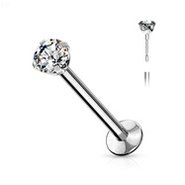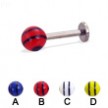Push In Prong Set CZ Top 316L Surgical Steel Labret
- Gauge (Thickness): 16 (1.2mm)
- Material: 316L surgical grade stainless steel
- Type: labret
- -: individually packed
- -: Made In USA
| Click on the picture to see a big picture and description of the body jewelry you are interested in. | |||||||||
|---|---|---|---|---|---|---|---|---|---|
|
14K Gold internally threaded labret with...
$54.99
14K Gold internally threaded labret with Black CZ
|
14K Gold internally threaded labret with...
$50.99
14K Gold internally threaded labret with Ruby
|
Titanium labret with double striped ball,...
$4.20
Titanium labret with double striped ball, 14 ga
Shown: 10mm labret with 6mm ball. |
14K Gold internally threaded labret with...
$69.99
14K Gold internally threaded labret with 4mm Garnet Cabochon
|
||||||
Titanium
Titanium is an extremely lightweight elemental metal similar to Niobium. The specific alloy used for body jewelry is 6AL4V (60 parts aluminum, 40 parts vanadium), specifically 136 grade with extra low interstitial elements.
“[Titanium’s] substantially inert surface oxide has high integrity and tenacity. The oxide will, if scratched or damaged, immediately restore itself in the presence of air or water. The film is stable over a wide range of pH, electro-potentials and temperature, particularly in neutral and oxidising environments.”
While the titanium alloy contains aluminum and vanadium, the oxide layer does not contain any traces of either element.
“Titanium is the most bio-compatible of all metals due to its total resistance to attack by body fluids.” Titanium is often used in permanent surgical implants where the tissue is encouraged to assimilate the implant. The body will readily accept titanium because of its non-reactive quality; in the case of implants, the pores allow for the tissue to attach.
Titanium jewelry is available in a range of colors through anodizing. Unanodized, titanium is medium grey in color and polishes to a smooth finish. Titanium and its oxide are harder than niobium; hence the color of anodized titanium usually lasts longer than that of niobium.
Titanium is extremely porous. Thus it is very difficult to achieve a smooth finish.




